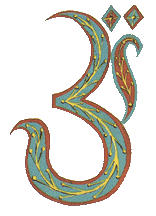 |

|
|
HINDUISM
Hinduism is one of the oldest known
organized religions--its sacred writings
date as far back as 1400 to 1500 B.C. It
is also one of the most diverse and
complex, having millions of gods, a wide
variety of beliefs, and many different
sects. Although it is the third largest
religion in the world, Hinduism exists
primarily in India, Nepal, and to a
smaller extent in a few of the
surrounding countries.
The main texts Hinduism uses are the
Vedas (considered most important),
Upanishadas, the Mahabharata,
and the Ramayana. These writings
contain hymns, incantations,
philosophies, rituals, poems, and
stories from which Hindus base their
beliefs. Other texts used in Hinduism
include the Brahmanas, the
Sutras, and the Aranyakas. Though Hindus believe in millions of gods (330
million according to many sources), they also believe that there is
one god that is supreme: Brahma. Brahma is an entity that is
believed to inhabit every portion of reality and existence,
throughout the entire universe. Brahma is both impersonal and
unknowable, and is often believed to exist in three separate forms
as: Brahma--Creator; Vishnu--Preserver; and
Shiva--Destroyer. These "facets" of Brahma are also known
through many other incarnations of each. |

WORLD RELIGIONS
COMPARED
WORLD
RELIGIONS CLIPART
WORLD
RELIGIONS HOME |
Hindus follow a strict caste system which determines
the standing of each person. The caste one is born into is the
result of the karma from their previous life. Only members of the
highest caste, the Brahmins, may perform the Hindu religious rituals
and hold positions of authority within the temples.
 |
AYURVEDA: The science
of Ayurveda, like the science of Yoga, was
inspired and developed by the great masters and seers of
ancient India. The origin of Ayurveda and Yoga are
common to play a highly complimentary role in spiritual
evolution and the maintenance of physical well-being and
vitality.
|
 |
BUDDHA: During his early
life, Buddha began his meditation as a Hindu. He was
awakened with a new enlightenment only to denounce
Hinduism and emerge as the founder of Buddhism, a new
religion.
|
 |
GODS / GODDESSES (DEITIES):
Hindus believe that God, in whatever form they prefer,
can grant worshippers grace to bring them closer to
Moksha, end of the cycle of rebirth. |
 |
HINDU BELIEFS:
Pilgrimage, chanting of holy hymns and home
worship are dynamic practices. Love, nonviolence, good
conduct and the law of dharma define the Hindu path
|
 |
HINDU FESTIVALS:
Indian Festivals are much more than celebrations. They
are windows into the history of rich Hindu legends. They
reveal the mind and philosophy of a nation through the
different ages.
|
 |
HINDU SECTS: India's Sanatana Dharma, or "eternal faith, " known
today as Hinduism comprises nearly a billion followers and is a family of religions with four principal denominations.
|
 |
HINDU SYMBOLS:
Sacred symbols which embody unspoken intuitions of the
spirit adorn India's art, architecture and iconography. |
 |
HISTORY: Although
today's Hinduism differs significantly from earlier
forms of Indian religion, Hinduism's roots date back as
far as 2000 BC, making it one of the oldest surviving
religions. Because of its great age, the early history
of Hinduism is unclear.
|
 |
SANATANA DHARMA
(HINDUISM): An eternal system which owes its
durability to its rationalism and not, as is often
supposed, to any divine origin. The major objectives are
ethics, creativity, harmony with instincts and finally
liberation from the human constraints. In Sanskrit these
were called Dharma, Artha, Kama and
Moksha.
|
 |
SPIRIT WORLD:
The gods are the Suras and the demons the Asuras or
"non-gods".
|
The World's Largest Hindu
Populations
Estimates in Millions
India - 895
Nepal - 21
Bangaledesh- 12.6
Indonesia - 5.9
Pakistan - 2.1
Sri Lanka - 2
USA - 2
Malaysia - 1.4
South Africa - 1.4
UK - 1.3
Highest Proportion of Hindus
India - 89%
Nepal - 86%
Mauritius- 59%
Guyana - 46%
Fiji - 42%
As the air is everywhere,
Flowing around a pot
And filling it,
So God is everywhere,
Filling all things
And flowing through them forever.
Ashtavakra Gita 1: 18-20

| |
 |
 |

